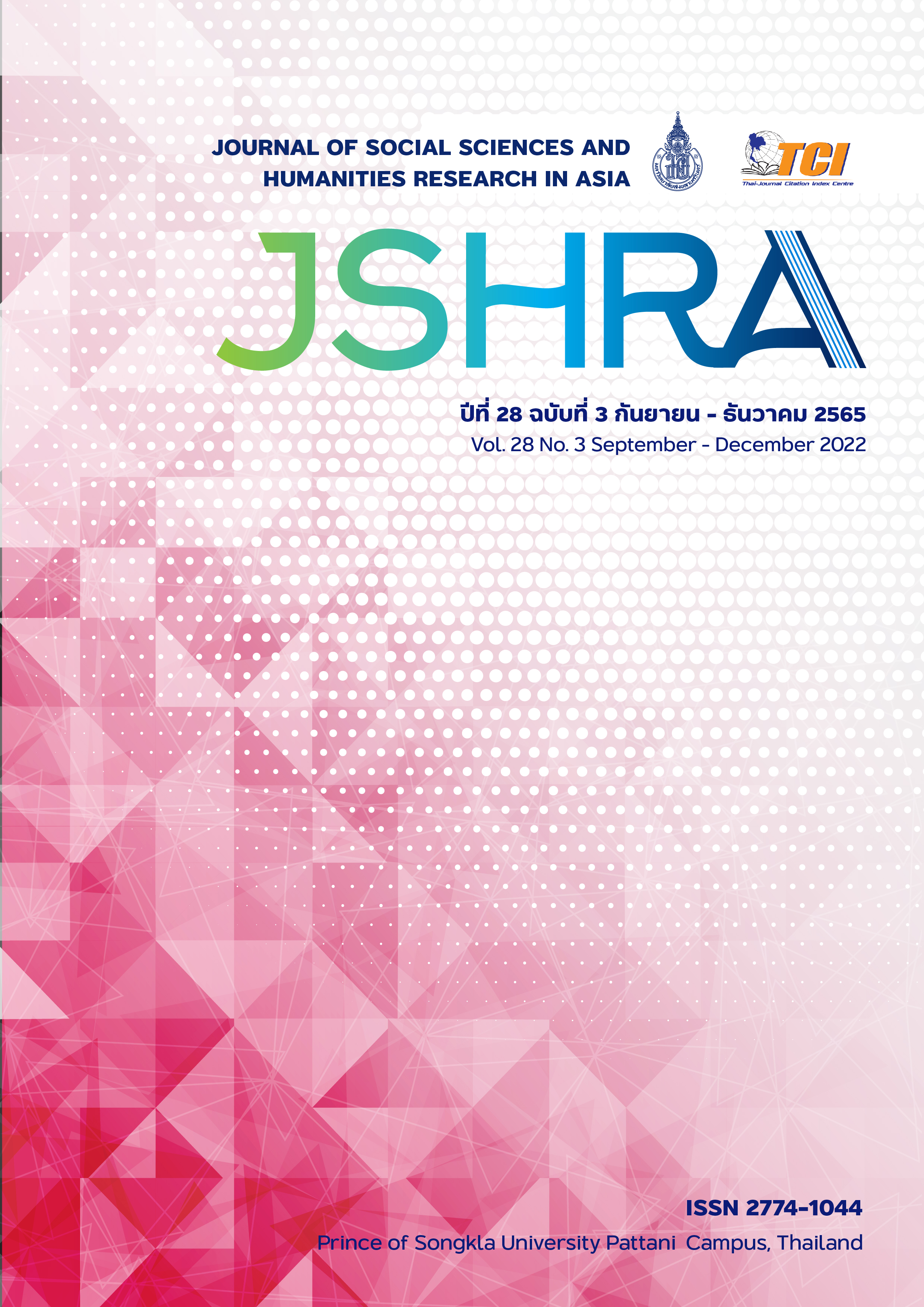A Comparative Study of Chinese Idiomatic Expressions in Modaozushi and Its Thai Translation "The Untamed"
Keywords:
Chinese Idioms, Modaozushi, The Untamed, TranslationAbstract
The objectives of this research were to study the characteristics of language structure and intention of using the meaning of Chinese idioms in Modaozushi(魔道祖师),and comparing it to the Thai translation version, "The Untamed". This descriptive research compiled 332 expressions of Chinese idioms from Modaozushi Vol. 1, and 13 expressions from "The Untamed" Vol. 1, with the aim of analyzing the language structure and intention of using the Chinese idiomatic expressions. Then, the Chinese idiomatic expressions in Modaozushi were analyzed and compared to those in the Thai translation version, "The Untamed". The research results showed that the grammatical structure of the Chinese idiomatic expressions in Modaozushi were classifed into seven categories, which were related to the elements of subject and predicate structure, verb and object structure, serial verb structure, parallel structure, main and modification structure, serial verb structure, and complex sentence structure. The intentions of using the meaning in Modaozushi were classified into five categories namely the Chinese idiomatic expressions with the intention of warning, sarcasm, reproach, admiring, and showing opinion. The translation of such idioms in Modaozushi was divided into three types, which were the translated idioms, non-translated idioms, and Thai idioms translated from the non-Chinese idiomatic expressions. The translated idioms were classified into three sub-types involving paraphrase, restatement translation, and substitute translations.
References
Bai, H. (2021). Study of literary identity of the internet novel “The Untamed”. Retrieved August 16, 2021, from https://www.cnki.com.cn/Article/CJFDTotal-HNSY202104014.htm
Bilibili. (2020). Elements of Chinese traditional culture in the animation of “The Untamed”. Retrieved November 2, 2021, from https://www.bilibili.com/read/cv8672502
Chaiwongsa, W., Sakulsueb, P., & Sakulsueb, T. (2021). Hero analysis with Christopher Vogler’s concept: Weiwuxian, from “The Untamed” series. Mangrai Saan Journal, 9(1), 1-18. https://so04.tci-thaijo.org/index.php/mrsj/article/view/249358
Denvipailerdlam, U. (2005). A Comparative study of Chinese and Thai idiomatic expressions on silver, gold and valuable objects (Master of Arts Programin Chinese). Chulalongkorn University.
Halipun, P. (2013). The study of a comparative the same meaning of proverb-saying. Retrieved September 20, 2021, from http://ubulachinese.blogspot. com/ 2013/03/blog-post_ 4304. html
Jitchinakul, K., & Horpianjaroen, S. (2017). The study of Thai-Chinese proverbs in current social life context (Research Report). Bangkok: University of the Thai Chamber of Commerce.
Kongmanusorn, W. (2006). Know all Thai idioms. Bangkok: Aksorn Charoen Tat.
Kongprom, P. (2020). Analysis of the costume designs from the “The Untamed” series (Bachelor of Arts Program in Asian Studies). Silpakorn University.
Li, M. (2019). A Contrastive study of Chinese and Thai color idioms (Master of Arts Program in Thai). Chiangmai Rajabhat University.
Rattanawan, T., & Maetaveevinit, W. (2021). An influence of popular culture through soft power in Chinese Period series. Retrieved December 6, 2021, from https://www.citu.tu.ac.th/wp-content/uploads/2021/07/Conference ReportNo10_20210928.pdf
Sawatyothin, S. (2019). Thai and Chinese prover with the word “snake”. Journal of Language, Religion and Culture, 8(2), 100-125.
Snowblack. (2019). “Buphaphonniwat” won the best Thai novel of the year award. Retrieved July 20, 2022, from https://praew.com/people/284218.html
Sripanngoen, S. (2000). A comparative study of Chinese idiomatic expressions containing the word “xin” with their Thai equivalents (Master of Arts Program in Chinese). Chulalongkorn University.
Wan, Y. (2000). Chinese vocabulary tutorial. Beijing: Beijing Language and Culture University Press.
Wanichviriya, J., & Thongaime, A. (2020). Chinese expressions: Purposes of usage. Suthiparithat Journal, 34(110), 227-240.
Wanmeilunwenwang. (2019). A Study on the narrative ethics of “The Untamed”. Retrieved October 27, 2021, from http://www.wmlunwen.com/yishulunwen/201912179154.html
Wu, J. (2020). On the artistic charm of the internet novel “The Untamed”. Retrieved October 29, 2021, from http://a.shayumei chuang.com/index.php?c=show&id=341
Zhongguo Shehui Kexueyuan Yuyan Yanjiusuo (Institute of Language, Chinese Academy of Social Sciences). (2006). Modern Chinese dictionary. Beijing: Commercial Press.










